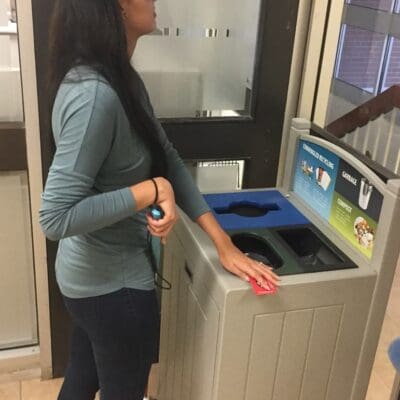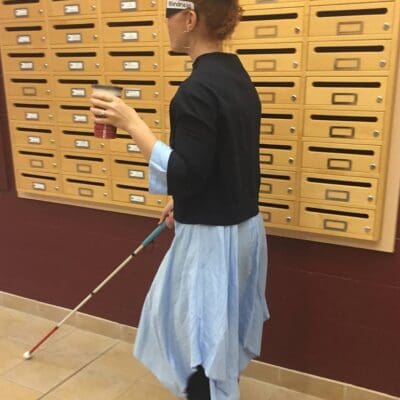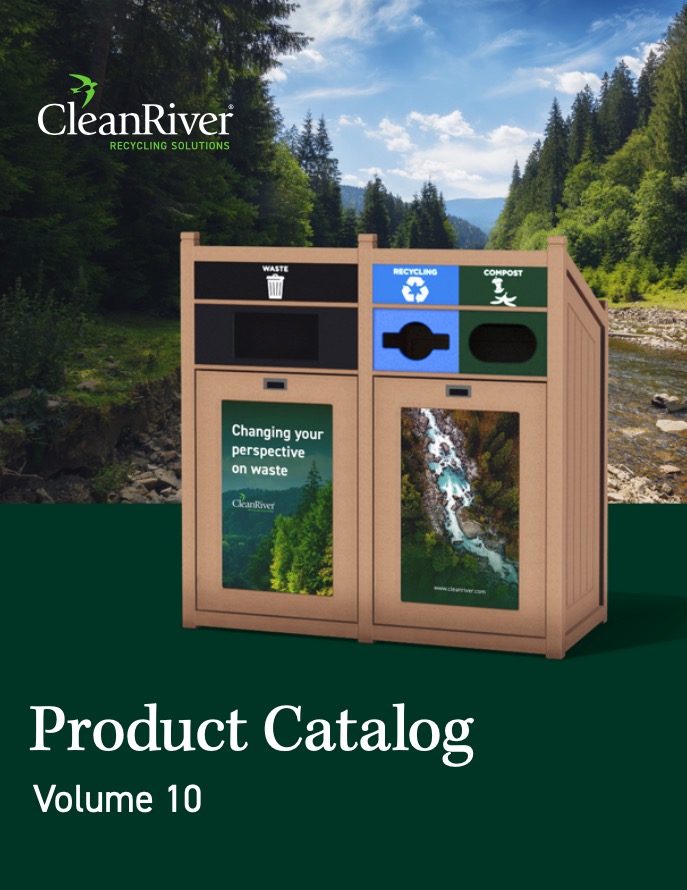Share
At CleanRiver we believe that everyone should recycle, but after meeting Hillary Scanlon, we were faced with the question; CAN everyone recycle?
Hillary Scanlon is an exceptional 22-year-old student at Wilfrid Laurier University who is challenging the notion that recycling, although it is everyone’s social responsibility, is also a privilege. Hillary is legally blind and her visual impairment has brought to light the fact that being able to recycle one’s waste is something most of us take for granted. In fall 2017, Hillary reached out to CleanRiver to pitch her project “Sustainability Through An Inclusive Lens” and since then she has held our intrigue and got us questioning our own notions about effective recycling programs.

For the past few months we have been working with Hillary to help develop a solution to her question: “How can we design a recycling program that can be effectively used by people of all abilities?” Needless to say we’ve had our eyes “opened” (pun intended) since meeting Hillary.
Here’s what Hillary has to say about the project, the process, and her hopes for the future, and accessibility of recycling.
A Little Background Info:
“It was almost 2 years ago exactly during the middle of completing my undergrad at Laurier that my vision unexpectedly deteriorated to the point of legal blindness. I went from having a driver’s licence, playing sports, just a normal university student, to having my life flipped upside down.”
Hillary is completing her major in Global Studies with a minor in Arabic and a minor social entrepreneurship.
“Since being presented with these new barriers I have taken a deep interest in presenting solutions to accessibility.”
Where Did The Concept Of Inclusive Recycling Come From?
“It started during a course I was taking called ‘Perspectives on Sustainability’ where someone came in to explain the different waste streams collected in the Waterloo Region. After the class I asked my professor if he had any suggestions for how someone who is blind (like me) could dispose of their waste properly in public. This was an ongoing challenge for me because on the one hand I don’t always know where the recycling and waste bins are located, especially when I’m in a new building or room I am unfamiliar with. The other part of the challenge is even if I find a bin, I can’t tell which stream is which. So, I’m always stuck carrying my garbage around with me all day. My choices are basically to either carry it, litter or just guess what stream I am tossing it in.
To be honest, when I first posed the question to my professor, I was actually expecting him to give me an answer and tell me how” Hillary laughs.
“But of course, he didn’t have an answer and he suggested that would be the perfect project for me to take on, so it just snowballed from there.”
She began to conduct research during her project “Sustainability Through an Inclusive Lens”. She felt that she had come up with a solution, but because of her experience with social entrepreneurship and business, she knew it was wrong to assume her experiences are the same as everyone else and that her solution would work for everyone.
“When I first began to examine this question and how to find a solution, I realized that my own biases and personal experiences could get in the way of developing the right solution. I mean what I think would work easily for me, would probably not work for everyone. I just knew if I really wanted to tackle this issue I needed to properly test and develop the concept with various stakeholders so I didn’t miss anything.”
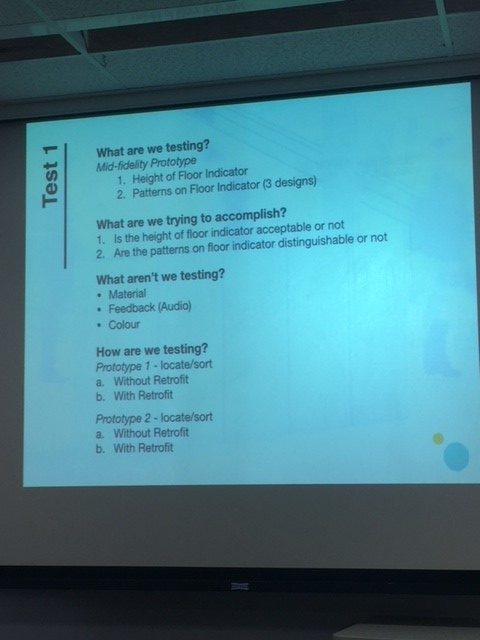
Hillary applied for funding to conduct her research and received a grant from the Wilfrid Laurier Sustainable Hawk Fund in May 2017 and began to work with Leading Minds Lab to help her set up four design labs with various stakeholders to help shape the results of the project.
CleanRiver was one of those stakeholders Hillary reached out to and we happily participated in all four Design Labs. Since then, Hillary has continued to work closely with the CleanRiver Engineering and Marketing teams in bringing the inclusive recycling program to fruition.
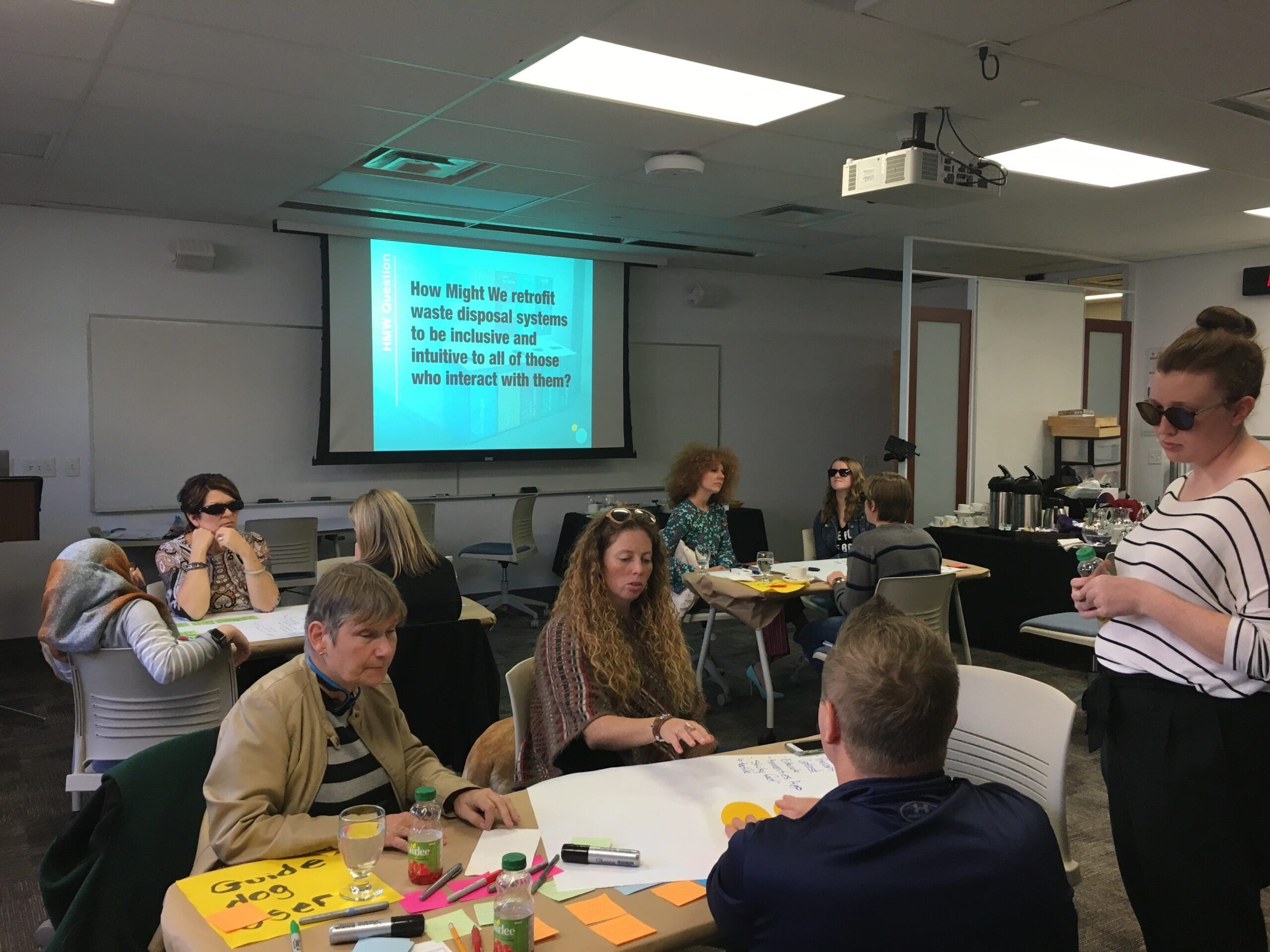
Why Did You Choose CleanRiver To Help With Your New Inclusive Recycling Program?
“During my initial research, I scoured through numerous different sites of recycling bin manufacturers, and CleanRiver was one of the only companies in North America with Accessibility Standards. It was also the only site which contained the words “disability” and “accessibility” within their searchable content (i.e. these terms were not found anywhere on other manufacturers’ websites).
All of our bins on campus are made by CleanRiver, so when I reached out to the Laurier Sustainability Office, they provided me with CleanRiver’s contact info, so it was just a perfect fit.”
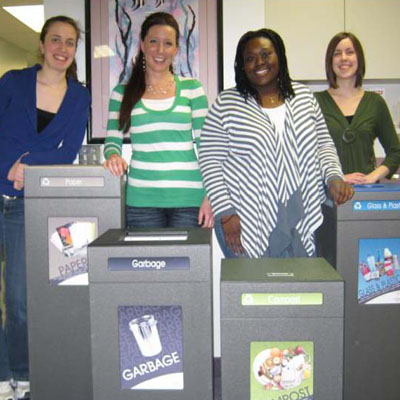
(CleanRiver manufactures all the recycling bins for Laurier and has partnered with them in implementing their campus recycling program).
“I reached out to the General Manager, Hugh initially, who was a great resource and he was able to give myself, Jennie and Lori (from Leading Minds Labs) a tour of the facility. After visiting the plant and hearing about the entire green manufacturing process and that everything is sourced locally, it was very encouraging to see how such a sustainable business model could be so successful. Right away their Engineer challenged me on my questions, the project and brought up aspects I had never even thought about. I knew CleanRiver’s participation would valuable.”

What Have Been Some Of The Highlights Of Your Inclusive Recycling Program Project?
“I gained such valuable insight from all of the different stakeholders, and I am so glad we were able to work through the different issues and problem solve as a group.”
The Four STIL Design Lab stakeholders included: Laurier Custodial Staff, CleanRiver Marketing and Engineering, Laurier Social Entrepreneurship students, Laurier Student Club Leaders, employees and clients from CNIB with various visual impairments, and an employee from Sustainable Waterloo Region.
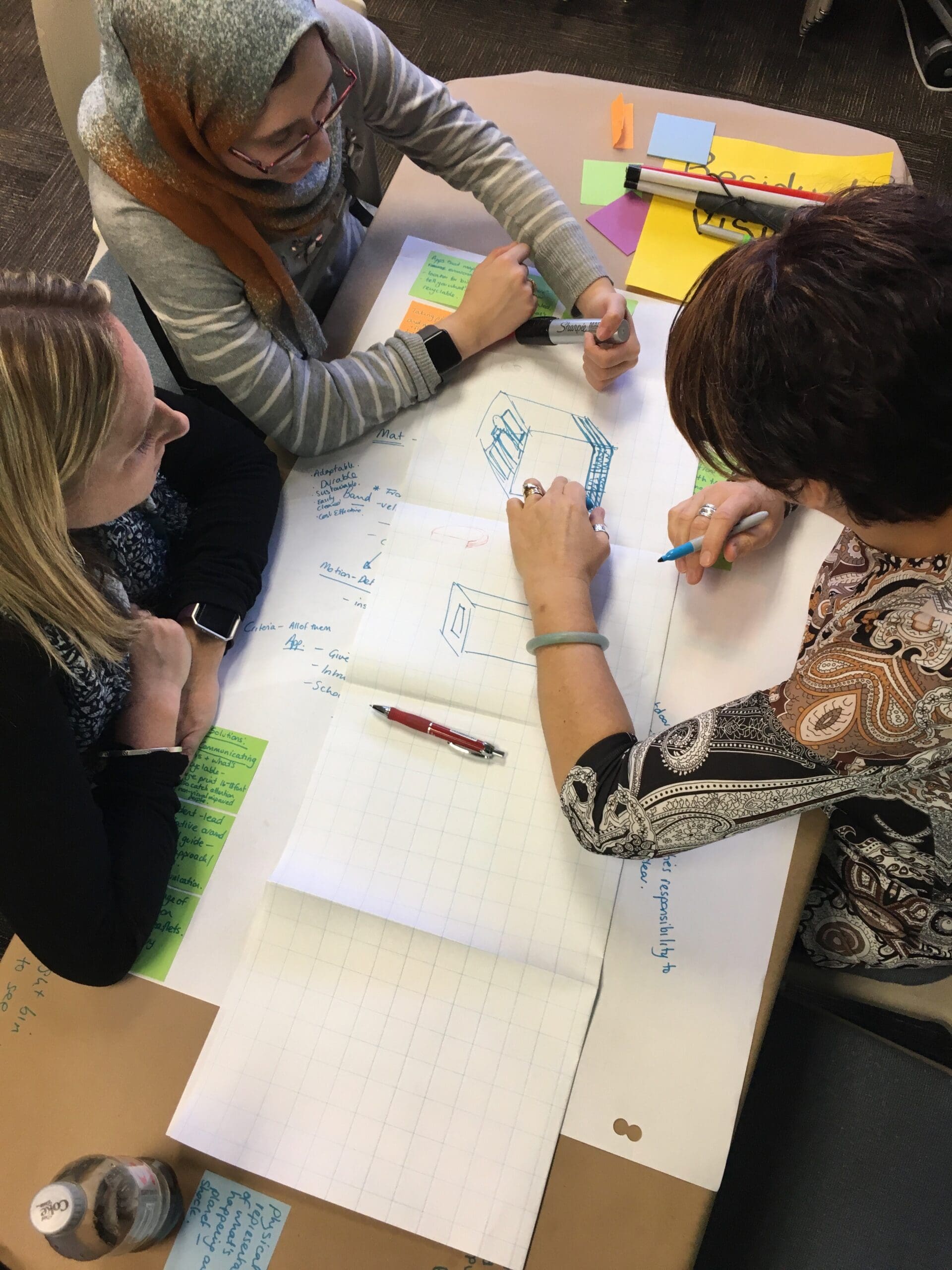
Some Of Hillary’s Key Learnings Included:
-“Having Dennis there (the Lead Hand Custodian) made me think of all the back work behind recycling programs, and it’s not just about the people throwing out their trash, but the people dealing with it afterwards.”
-“The idea of raised lettering on the bins to identify each stream as an easy solution was immediately debunked by CleanRiver and CNIB, as there isn’t one universal word for garbage or recycling. It’s difficult to know what items fall under each umbrella.”
-“Using braille is also not an easy fix. Only a small percent of the blind can actually read it, and raised print is also an issue for kids who can’t read yet, people’s language barriers and learning disabilities. And besides that, who wants to use their hands to feel around a garbage can?”
-“Realizing this project is only step one and not a full-blown solution.”
According to Hillary “Inclusive Recycling needs to be a National Issue and Institutes need to take into consideration people with disabilities when it comes to their architectural design and recycling programs.”
What’s Next?
“I am in the process of applying for further funding and ideally I would like to use Laurier as the first institution to use our proven prototype by September 2018.
Right now we are in the testing phases at Laurier and CNIB in Toronto of the prototype we developed during our four STIL design labs. With these tests we are hoping to increase usability for people with visual impairments as well as increase waste diversion overall. From the communications aspect of this project we are hoping that the end result encourages people of all abilities to better recycle their waste. That’s the goal and we will continue to test those metrics.”
Stil Lab group members from CleanRiver & Sustainable Waterloo Region testing first prototypes.
CleanRiver continues to support Hillary as she continues to develop a solution for Inclusive Recycling.
Stay tuned as we will continue to share Hillary’s journey and results of Sustainability Through an Inclusive Lens.
For more information on campus or school recycling programs, check out our blogs 4 Most Commonly Asked Questions About Campus Recycling and Ask Our Expert: 3 Tips for The Most Effective College or University Recycling Program
CleanRiver Recycling provides a variety of innovative, flexible and customizable recycling solutions. To determine the right solution to meet your needs, use the CleanRiver product selector.
If you have additional questions that weren’t answered in this blog post please call us at 1-888-646-4246 or email solutions@cleanriver.com.

